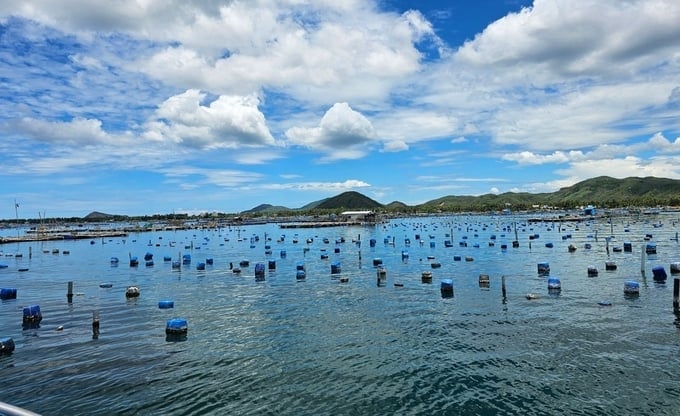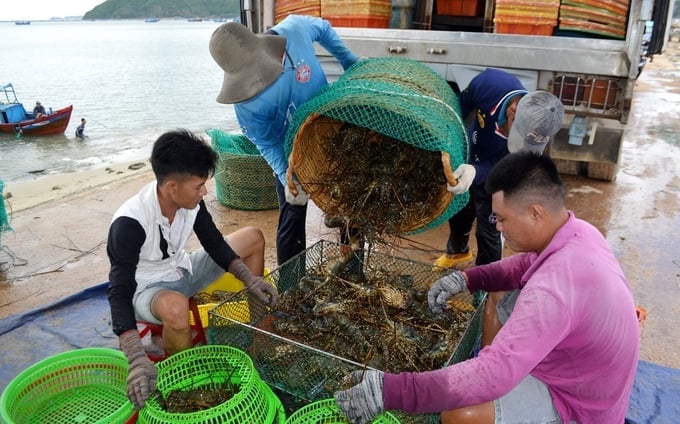November 20, 2025 | 03:11 GMT +7
November 20, 2025 | 03:11 GMT +7
Hotline: 0913.378.918
November 20, 2025 | 03:11 GMT +7
Hotline: 0913.378.918
Phu Yen province has great potential and advantages for developing aquaculture due to it having over 21,000 ha of water surface including ponds, bays, estuaries, and river mouths. Over the past 30 years, the aquaculture industry in this province has developed significantly with over 110,000 aquaculture cages, mainly for lobster and marine fish.
Song Cau town is the "capital" of lobsters in Phu Yen province. In 2023, the town had about 62,550 lobster cages, producing 2,070 tons. Of these, 90% are blue lobsters and 10% are rock lobsters, generating an annual revenue of over VND 2,000 billion.

Lobster cage farming area in Song Cau town. Photo: KS.
In recent years, this industry has not only brought economic benefits but also made significant contributions to society, providing stable employment for the local population.
According to the People's Committee of Song Cau town, lobster farming has contributed to employment for over 4,000 households, with about 10,000 workers directly involved. The lobster production in the town is mainly exported to the Chinese market.
Mr Nguyen Thai Hai Anh, Deputy Director of the Office of Economics of Song Cau town, stated that 80-90% of the lobster production in the area is exported to the Chinese market through unofficial channels, which lacks stability.
Therefore, to develop lobster farming in a sustainable direction, the town is addressing challenges related to land allocation for water surfaces, licensing, and zoning codes for aquaculture areas. Additionally, they are building supply chains, issuing codes for businesses, seeking partners, and expanding markets to stabilize the output for lobster products.
According to Mr Hai Anh, Phu Yen province has granted a code to Tien Kieu Co., Ltd. to export lobsters through official channels to the Chinese market.
Ms. Nguyen Thi Tuy Kieu, Director of Tien Kieu Co., Ltd., stated that to export lobsters through official channels to the Chinese market, the company has studied the regulations of both Vietnam and China. After more than 2 years of effort, the company has been included in the list by China and granted a code to export lobsters to this market.
In order to support farmers and businesses in accessing the process of exporting lobsters through official channels, recently, the Quality Assurance Center for Agriculture, Forestry, and Fisheries of Region 3, in coordination with the People's Committee of Sông Cầu town, organized training to provide information on Chinese requirements for exporting lobsters to this market.
Mr Le Hoang Lam, Director of the Quality Assurance Center for Agriculture, Forestry, and Fisheries of Region 3, stated that so far, the Chinese market has recognized 850 seafood processing establishments in Vietnam for producing and exporting seafood to this market. Among them are 57 establishments exporting live seafood (there is 1 facility in Phu Yen).

Buying lobster in Song Cau town, Phu Yen province. Photo: KS.
In addition, the Quality Assurance Center for Agriculture, Forestry, and Fisheries of Region 3 is also disseminating Vietnam's and other countries regulations on exporting agricultural, forestry, and aquatic products to the business community and residents.
The Chinese market is one of the potential markets for live seafood products, especially lobsters. Therefore, exporting companies and farmers must know and understand the processes and regulations to ensure compliance, contributing to the sustainable development of the seafood industry.
The price of lobster has dropped to below VND 1 million/kg (type 1), while in July 2023, it was priced at VND 1.7-1.8 million/kg. The reason is that China has banned fishing, use, trade, and business for spiny lobsters and species on the list of critically endangered wild animals that need protection.
Therefore, to export lobsters to the Chinese market, companies must prove that lobsters are not directly caught from the sea and demonstrate clear farming processes without using naturally harvested seed sources.
Regarding this issue, according to the Quality Assurance Center for Agriculture, Forestry, and Fisheries of Region 3, the Ministry of Agriculture and Rural Development is continuing negotiations, and China has promised to create a special mechanism for Vietnamese lobsters to be exported to this market.
Mr Lam Duy Dung, Vice Chairman of the People's Committee of Song Cau town, said that lobster farming still faces many challenges, such as managing farming areas and limited lobster exports through official channels.
Locally, they always accompany and support enterprises, cooperatives, and farmers in identifying the necessary standards and conditions to facilitate lobster exports to the Chinese market. This is also the town's goal to develop lobsters sustainably and effectively.
Mr Tran Van Thom, Vice Director of the Comprehensive Service Cooperative for Lobster in Song Cau, said that China is a potential market for Vietnamese lobsters. However, this market is becoming increasingly stringent and demanding in terms of quality and origin. Therefore, to meet these requirements, the cooperative is investing in infrastructure, and workshops to meet standards, as well as completing documents and regulations required by China to soon be granted a code for exporting live lobsters to this market.
Translated by Hoang Duy

(VAN) The price of Arabica Catimor coffee in Quang Tri is currently at VND 25,000–27,000/kg (fresh cherries), the highest level ever recorded

(VAN) 'From the coffee story, we can think deeper and further about the crop production sector - from development orientations and value-chain organization to international integration,' assessed Dr Le Quoc Doanh.
/2025/11/18/2431-0-161627_248.jpg)
(VAN) Viet Nam accounts for 43% of the world's export volume of Robusta coffee. However, the Vietnamese Robusta coffee brand has yet to gain broad recognition on the global market.
/2025/11/18/5617-2-125215_406.jpg)
(VAN) The consumption demand for premium, healthy, and cold-brew tea products is rising globally, including in the Thai market, opening new opportunities for Viet Nam.

(VAN) The 3F+ model aims for selective resource management, regenerative protection, green education and consumption, all intrinsic to Dabaco’s sustainable development strategy.

(VAN) Carefully packed tea bags, neatly arranged inside containers, begin their 5,000-kilometer journey to Afghanistan, carrying with them the aroma of mountain forests and the pride of Lai Chau province.

(VAN) 'If we can address disease challenges and properly plan farming zones, Vietnamese shrimp can absolutely rise to lead the world,' Mr. Le Van Quang affirmed.